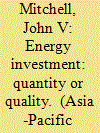| Srl | Item |
| 1 |
ID:
051901


|
|
|
|
|
| Publication |
May 2004.
|
| Summary/Abstract |
The World Energy Investment Outlook, published by the IEA in November 2003, questions the conditions for financing future energy investments, especially in developing countries for the power sector, and for energy exports to the OECD. Mitchell reviews the role of governments in energy investment in OECD countries. This leads to a conventional wisdom about conditions which OECD investors would like to see, but not much guidance on issues of resource rents or conflicts arising from differences between local costs and national benefits. An "Institutional agenda" of initiatives (WTO, TRIMS, GATS and the Energy Charter Treaty) seeks to export OECD conditions and promote "good governance" in developing countries. There is also a "Behavioral agenda" in which international companies are persuaded to promote a variety of millennium goals, including human rights, poverty reduction, and environmental sustainability. These factors have different relevance in different countries in which major energy investments are foreseen. Finally, Mitchell suggests that "acceptability" is an inclusive concept under which the OECD type initiatives can be combined with regard for the circumstances and interests of the different non-OECD countries, to give an operational definition of investment "quality."
|
|
|
|
|
|
|
|
|
|
|
|
|
|
|
|
| 2 |
ID:
126804


|
|
|
|
|
| Publication |
2014.
|
| Summary/Abstract |
The structure of the oil and gas industry is being disrupted by technical developments which increase supply and reduce demand, the reversal of growth in demand in transport in OECD countries and less dependence of the US and Europe on Middle East oil supplies. Upstream, expectations of scarcity are changing to expectations that, at current prices, national oil companies face increasing competition from public listed companies which use diverse advanced technologies to develop reserves in areas outside NOC control. The public listed companies also have the opportunity to bring specialized technology to match NOC needs. Downstream oil markets are dividing into the OECD markets where growth has been reversed and a non-OECD markets where it continues. This is a challenge for the major public listed companies whose downstream operations are concentrated in the OECD. They may respond by focusing on local advantages or by separating the downstream from their upstream businesses. The natural gas industry is being transformed by new discoveries, particularly in the US, but regional markets remain separated by transport costs and pricing systems. The challenge will be to find prices which will grow both the supply and demand in each region.
|
|
|
|
|
|
|
|
|
|
|
|
|
|
|
|